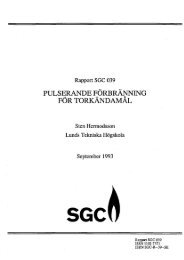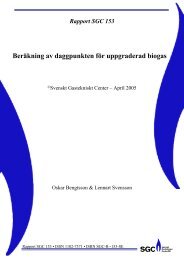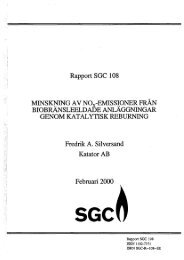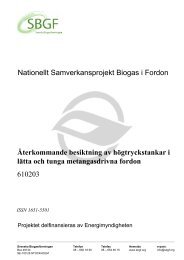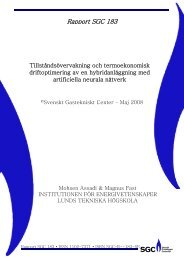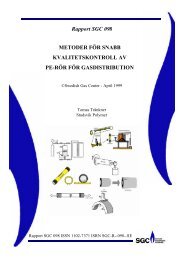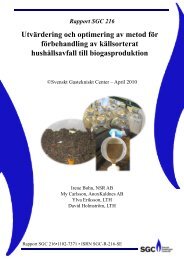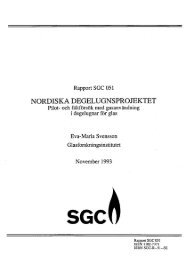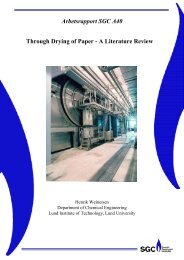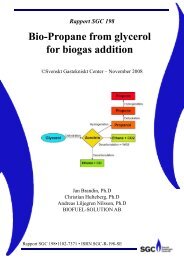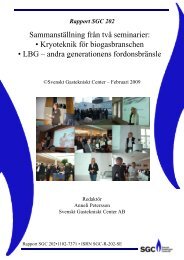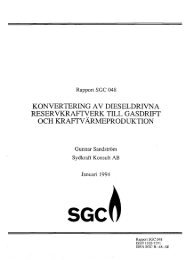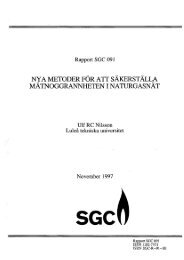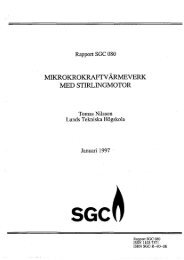Adding gas from biomass to the gas grid - SGC
Adding gas from biomass to the gas grid - SGC
Adding gas from biomass to the gas grid - SGC
- No tags were found...
You also want an ePaper? Increase the reach of your titles
YUMPU automatically turns print PDFs into web optimized ePapers that Google loves.
Bio<strong>gas</strong> is fed in<strong>to</strong> <strong>the</strong> natural <strong>gas</strong> <strong>grid</strong> at two sites. One is a low pressure branch of <strong>the</strong> <strong>grid</strong> and <strong>the</strong>bio<strong>gas</strong> is <strong>the</strong>refore upgraded with PSA technology <strong>to</strong> meet <strong>the</strong> natural <strong>gas</strong> specifications. The o<strong>the</strong>rsite is at <strong>the</strong> high pressure transmission <strong>grid</strong> and here <strong>the</strong> bio<strong>gas</strong> is added <strong>to</strong> <strong>the</strong> <strong>grid</strong> withoutupgrading. This is due <strong>to</strong> <strong>the</strong> very small percentage <strong>the</strong> bio<strong>gas</strong> adds <strong>to</strong> <strong>the</strong> natural <strong>gas</strong> so <strong>the</strong>re isno need for upgrading.Three bio<strong>gas</strong> plants, utilising <strong>biomass</strong>, in Switzerland have filling stations for <strong>gas</strong>. There are noexplicit data available about <strong>the</strong> upgrading technique, but PSA seens <strong>to</strong> be <strong>the</strong> most commontechnology in Switzerland.A pilot project concerning bio<strong>gas</strong> upgrading has been conducted. The project was divided in<strong>to</strong> twostages. The stage 1 pilot plant was constructed at <strong>the</strong> bio<strong>gas</strong> plant in Rümlang. The upgradingmethod was water scrubbing and <strong>the</strong> plant was started in 1993. The capacity was 12 m 3 /h. The <strong>gas</strong>quality was not as good as expected. The specifications could hardly be met. The energyconsumption for <strong>the</strong> upgrading process equalled one third of <strong>the</strong> <strong>gas</strong> energy in <strong>the</strong> upgradedmethane <strong>gas</strong>. In stage 2 a PSA plant was built at <strong>the</strong> Bachenbülach bio<strong>gas</strong> plant in 1995 with acapacity of 26 m 3 /h. This plant had no problems in meeting <strong>the</strong> quality specifications and <strong>the</strong> energydemand for <strong>the</strong> upgrading process was only 8% of <strong>the</strong> heat value of <strong>the</strong> upgraded <strong>gas</strong>. Theinvestment cost for <strong>the</strong> PSA plant was almost one third lower than for <strong>the</strong> water scrubbing plant,even since <strong>the</strong> PSA plant had more than <strong>the</strong> double capacity.Filling stations in Switzerland are of two main types. Fast filling with compressor and high pressures<strong>to</strong>rage tanks for <strong>gas</strong>, and overnight filling equipment where <strong>the</strong> compressor is filling directly in<strong>to</strong> <strong>the</strong>vehicle. These slow filling stations are sold for <strong>the</strong> use of one or only a few vehicles at a time andhave a trademark of ‘FuelMaker’. The number of fast filling stations is increasing at this moment.7.3 POLICY7.3.1 EuropeDirective on natural <strong>gas</strong>The access of fuel <strong>gas</strong>es <strong>to</strong> <strong>the</strong> European market is regulated in <strong>the</strong> 1998 EU directive ‘Commonrules for <strong>the</strong> internal market in natural <strong>gas</strong>’ [lit.33]. This directive sets <strong>the</strong> right of any producer <strong>to</strong> sellhis fuel <strong>gas</strong> <strong>to</strong> any client in Europe. This directive is limited <strong>to</strong> natural <strong>gas</strong>. Liquefied natural <strong>gas</strong>(LNG) and <strong>gas</strong>es <strong>from</strong> natural <strong>gas</strong> s<strong>to</strong>rages are explicitly included in this directive. Gases <strong>from</strong><strong>biomass</strong>, organic waste, coal or oil are not explicitly mentioned.It is left <strong>to</strong> <strong>the</strong> Member States <strong>to</strong> impose public-service obligations <strong>to</strong> <strong>the</strong> natural <strong>gas</strong> undertakingsfor security, security of supply, regularity, quality, price of supplies and environmental protection.From this directive it may be expected that all <strong>gas</strong> <strong>from</strong> <strong>biomass</strong> that meets <strong>the</strong> requirements of anatural <strong>gas</strong> may be added <strong>to</strong> <strong>the</strong> <strong>grid</strong>.page: 95



